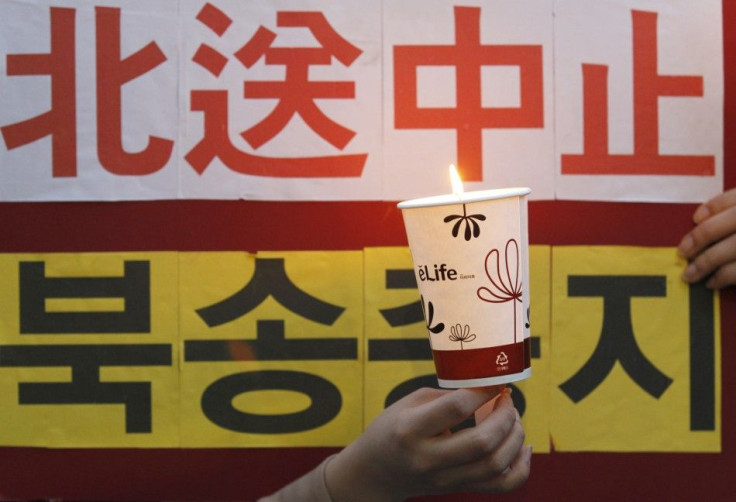South Korean Activists Detained In China After Speaking With North Korean Refugees

For the past several weeks, four South Korean activists have been detained by China in the northeastern city of Dalian, according to a statement from South Korea's foreign ministry. It appears the activists were meeting with North Korean refugees in China in order to learn about their experiences.
The Network for North Korean Democracy and Human Rights (NKnet) reports that Kim Young Hwan, a well-known activist and head researcher for NKnet, is among the detainees. Kim first made a name for himself in the 1980s as a pro-North Korean activist, famously sneaking aboard a submarine to introduce himself to Kim Il-Sung, the iconic first leader of Communist North Korea.
But after learning more about life in Pyongyang, Kim reversed his opinion. Since then, he has pushed for democracy, human rights and market liberalization in both North and South Korea.
NKnet identifies the other three detainees as Yu Jae Gil, Kang Shin Sam and Lee Sang Yong. The organization reported on Monday that the four South Korean activists have undergone forcible interrogation under Chinese custody and may face a charge of threat to national security, or espionage. Of all the detainees, only Kim has been allowed to meet with the South Korean consul.
So far, no formal charges have been announced by Chinese officials in Dalian.
South Korea understands that [the] investigation is proceeding based on procedures under Chinese law, South Korea foreign ministry spokesman Cho Byung-je said on Tuesday. He asked Beijing to handle the case fairly and quickly.
North Korean refugees often leave their home country due to human rights violations, food shortages or otherwise poor social conditions. They typically pass through China en route to other countries, though many stay in hope of making a living without being detected by China's government. The estimated number of North Koreans within China today varies greatly -- conservative estimates have put the number at around 30,000, but some say there could be hundreds of thousands. If identified by Chinese authorities, North Koreans are treated as illegal migrants and repatriated to North Korea, where they face an uncertain threat.
Activist groups like NKnet have urged China not to return these refugees to North Korea, since they often face harsh punishments upon re-entering their home country. But Beijing's alliance with Pyongyang has prevented China from complying with those requests.
© Copyright IBTimes 2024. All rights reserved.





















